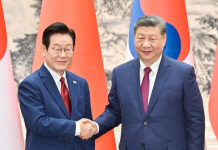Deng Yueling started work at the Wanshouyan Cultural Heritage Museum in Sanming, Fujian province, in April. Initially, though, the Stone Age artifacts on display did not interest her.
Since then, the 24-year-old tour guide has delved deeper into the history of the Paleolithic (about 2 million to 10,000 years ago) stone tools and animal bones discovered in a cave on nearby Wanshouyan Hill.
The artifacts suggest that humans lived in the area about 185,000 years ago, the oldest evidence of such activity in coastal China.
“The more I learn, the prouder I feel about the archaeological discoveries in my hometown,” said Deng, who is from Yanqian, a village about 800 meters from the spot where the relics were found.
When she guides visitors round the museum, Deng always explains the story behind the discovery of the artifacts and how they survived potentially devastating mining activities more than 20 years ago.
Excavations: Researchers launched a series of digs in the 1990s in the 100 or so Karst caves in Sanming, including those on Wanshouyan Hill. While they found many fossilized mammalian teeth on the hill, it was too early to say they confirmed long-term human settlement.
Zhu Kai, deputy director of the Sanming Conservation Center for Cultural Heritage, said the city government required Sanming Steel Group to provide 80,000 yuan and sponsor archaeological digs in the hills, but the agreement was only valid for a month.
Xi’s instructions: Wanshouyan faced a gloomy outlook until Xi’s instructions arrived.
On New Year’s Day, 2000, he issued an order to protect the Wanshouyan heritage site, saying it held the first key Paleolithic findings in Fujian and was home to crucial prehistoric heritage items.
“It is a must to carefully protect the site,” Xi wrote, stressing that safeguarding the artifacts was everyone’s responsibility and also an important element in the implementation of the nation’s sustainable development strategy.
Rejuvenation: During an inspection tour in Gansu province last year, Xi made his first stop at Dunhuang, home to the Mogao Grottoes, a UNESCO World Heritage Site, as he highlighted the importance of the fine traditional culture in the rejuvenation of the Chinese nation.
Improvements: To further improve the area’s natural environment, many factories nearby were closed in 2012, and the routes of some roads used for cargo transportation were changed.
– The Daily Mail-China
Daily News exchange item






